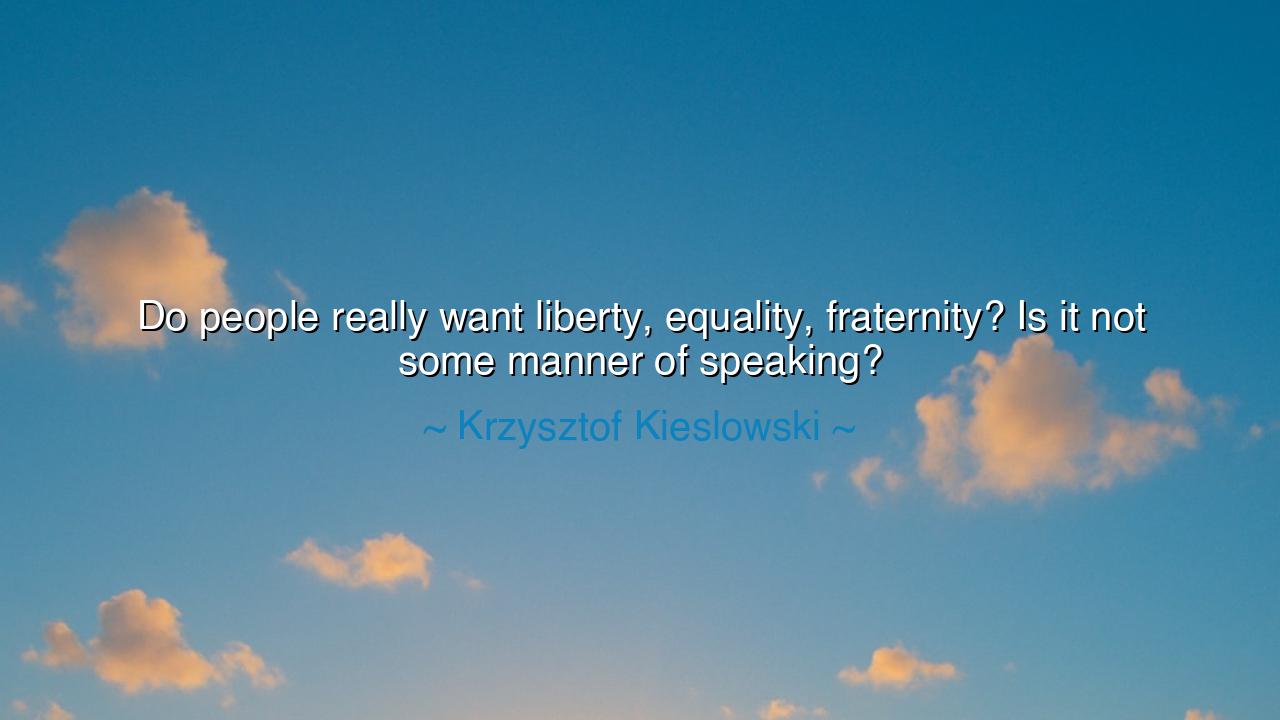
Do people really want liberty, equality, fraternity? Is it not
Do people really want liberty, equality, fraternity? Is it not some manner of speaking?






In the haunting words of Krzysztof Kieślowski, poet of the screen and philosopher of the human soul, we are confronted with a question that pierces through the veil of civilization: “Do people really want liberty, equality, fraternity? Is it not some manner of speaking?” Here, the artist does not deny these ideals—he doubts humanity’s sincerity toward them. He asks, not with bitterness, but with sorrowful wisdom, whether our noble words are truths of the heart or merely adornments of the tongue. For liberty, equality, and fraternity, though proclaimed by nations and carved into monuments, often fade in practice beneath the weight of fear, greed, and habit.
To understand the meaning of this quote, one must first recall its sacred triad—Liberty, Equality, Fraternity—the cry of the French Revolution, the promise that thundered through Europe as kings fell and peoples rose. These words became the anthem of democracy, the foundation of modern human rights. Yet Kieślowski, living through the storms of 20th-century Poland—war, dictatorship, and the false dawn of political freedom—had seen how swiftly ideals crumble when tested by reality. He had watched as liberty became license for cruelty, equality turned to envy, and fraternity dissolved into faction. His question, then, is not cynical; it is reflective. He asks: do we truly desire these virtues, or do we merely worship their image?
The origin of Kieślowski’s doubt lies in his lifelong exploration of human contradiction. Through his films—such as The Decalogue and Three Colors: Blue, White, Red—he revealed how people profess moral truths while living in quiet disobedience to them. He saw that men speak of freedom but cling to comfort; that they praise equality yet crave superiority; that they invoke fraternity but close their doors to the stranger. His question, therefore, is not about politics but about the human heart. Do we have the courage to bear the responsibilities that true freedom demands? Do we desire equality when it requires the surrender of privilege? Do we seek fraternity when it asks us to love those we dislike or fear?
History, too, bears witness to his insight. When the French Revolution toppled tyranny, its champions cried for liberty, equality, and fraternity, yet within a few years, the guillotine had replaced the crown. In the name of equality, suspicion devoured trust; in the name of fraternity, citizens betrayed neighbors. The ideal, once pure, became tainted by human frailty. Likewise, in modern times, nations declare liberty while silencing dissent, or demand equality while preserving systems of power. Kieślowski’s question lingers over every age: have we mistaken the poetry of ideals for their practice? Have we fallen in love not with justice itself, but with the sound of its name?
And yet, his words need not be heard as despair, but as challenge. For if humanity is to be worthy of its own promises, it must first face its hypocrisy. To ask whether we truly want liberty is to ask whether we are willing to accept the loneliness of freedom—the weight of choosing rightly when no one commands us. To ask whether we want equality is to ask whether we can rejoice in another’s success as our own. To ask whether we want fraternity is to ask whether we can love beyond tribe and self. The ideals remain eternal; it is we who must grow to deserve them.
Consider the story of Nelson Mandela, who spent twenty-seven years imprisoned under apartheid. When he was finally freed, he did not seek vengeance but reconciliation. He practiced liberty not as indulgence, but as forgiveness; equality not as revenge, but as dignity restored; fraternity not as empty slogan, but as action. In him, Kieślowski’s question finds an answer: yes, some souls do truly desire these things—but they are rare, and their labor is immense. For it is easy to speak of freedom when one is free, but to uphold it when oppressed is the mark of greatness.
The lesson, then, is both humbling and empowering. If we wish to claim the ideals of liberty, equality, and fraternity, we must begin not with nations, but with ourselves. Let liberty mean the courage to be truthful; let equality begin with respect for every life we touch; let fraternity grow from kindness to the stranger, the neighbor, the enemy. These words must not remain “a manner of speaking,” but a manner of living.
Therefore, remember the wisdom hidden in Kieślowski’s doubt: do not mistake the music of ideals for their meaning. It is easy to sing of virtue, harder to live it. Each generation must test itself anew, must prove that it desires freedom not only in comfort, but in conscience. For the true revolution is not fought with weapons or slogans—it is fought within the heart, where the soul decides whether it truly wishes to be free, equal, and brotherly. And when enough hearts answer “yes,” then—and only then—will liberty, equality, fraternity cease to be words and become the living law of humankind.






AAdministratorAdministrator
Welcome, honored guests. Please leave a comment, we will respond soon